2023年中考英语语法专题--介词复习课件(共29张PPT)
文档属性
| 名称 | 2023年中考英语语法专题--介词复习课件(共29张PPT) |  | |
| 格式 | pptx | ||
| 文件大小 | 1.4MB | ||
| 资源类型 | 试卷 | ||
| 版本资源 | 人教新目标(Go for it)版 | ||
| 科目 | 英语 | ||
| 更新时间 | 2023-01-11 17:31:18 | ||
图片预览


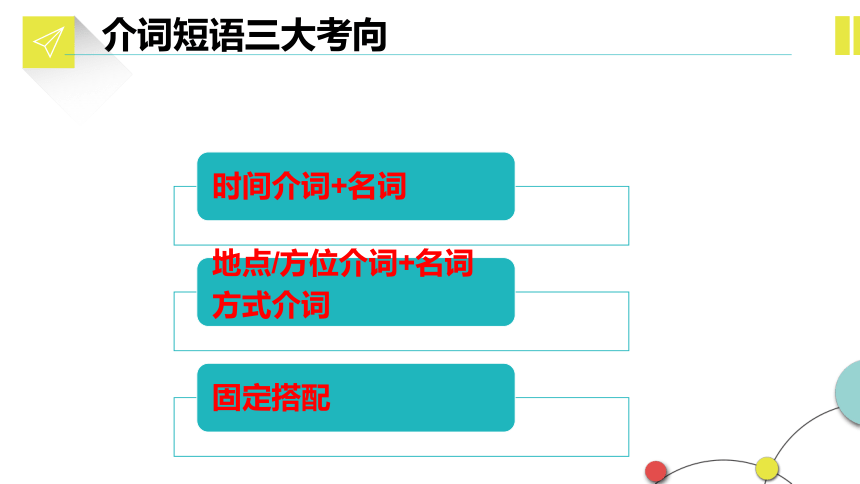
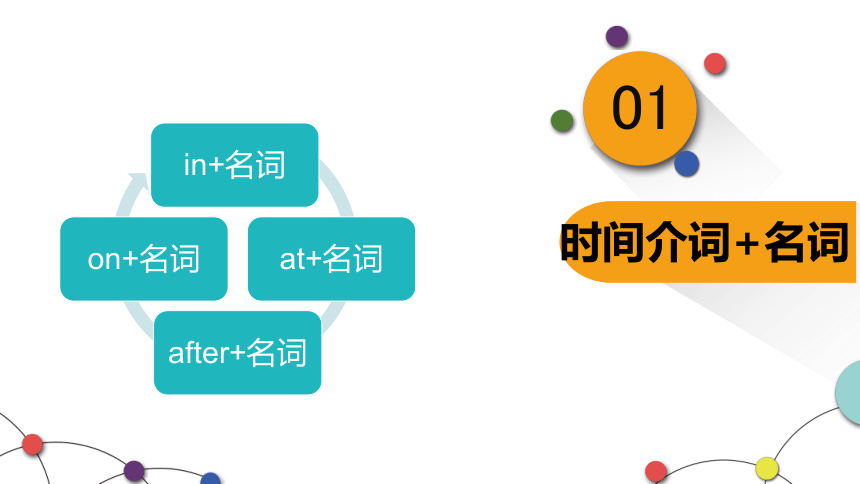
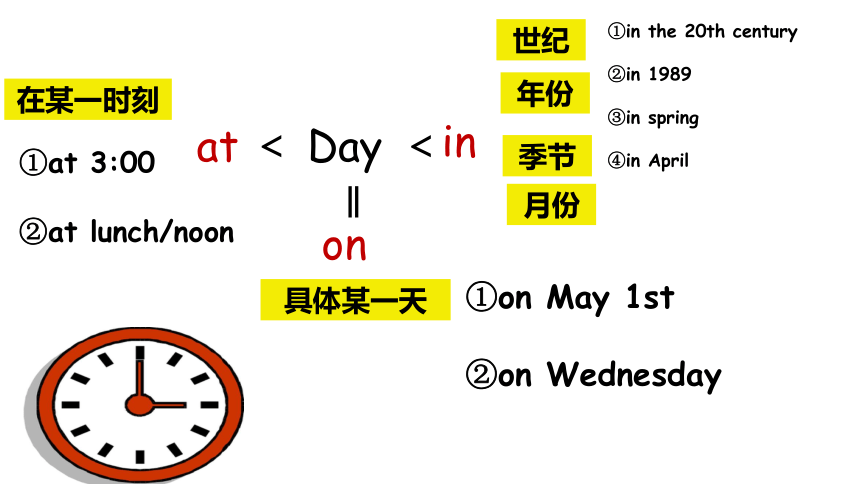
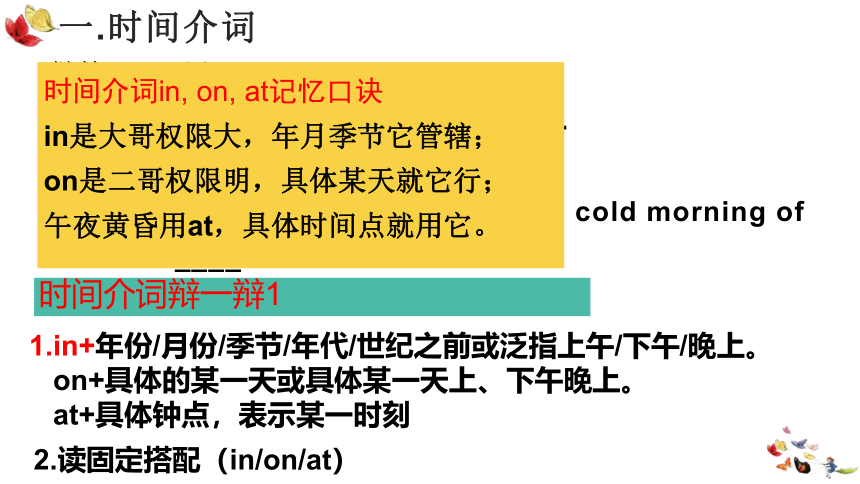
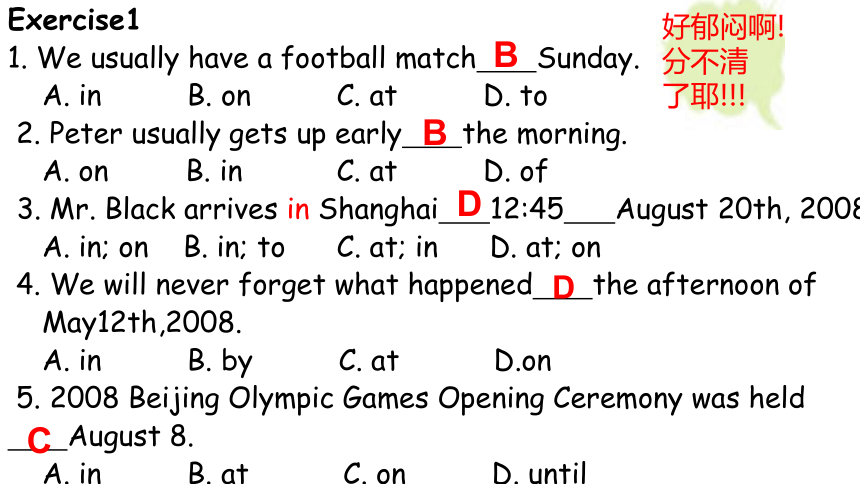
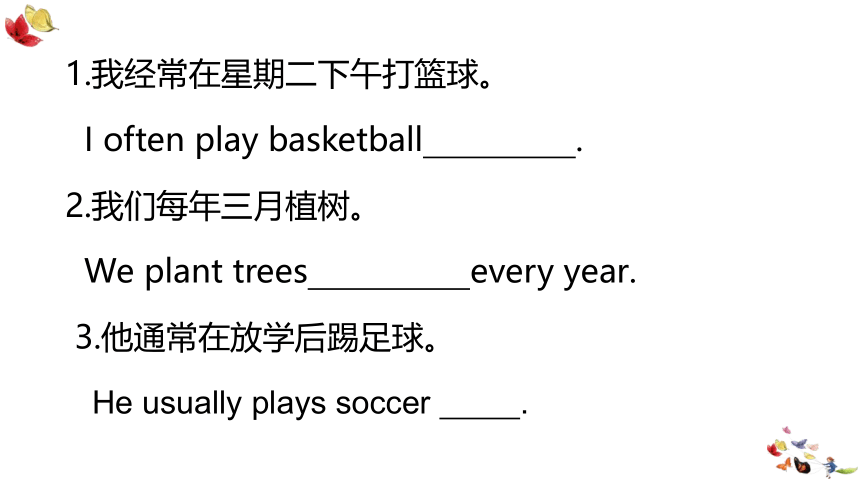
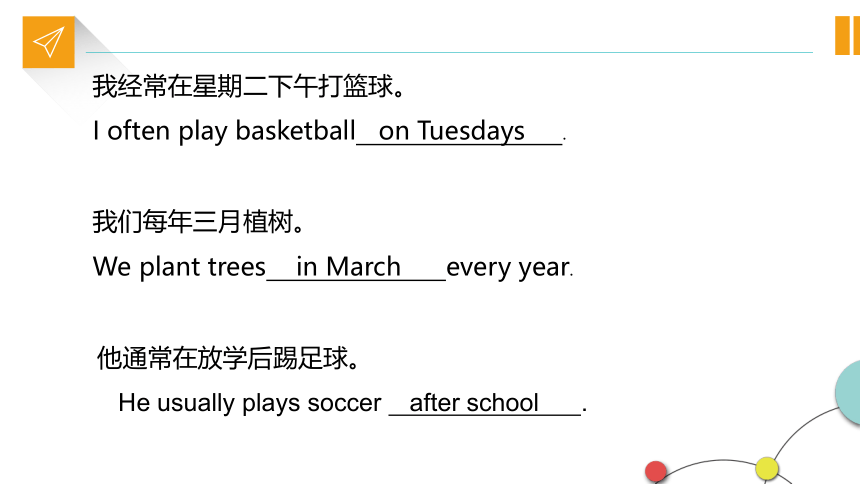
文档简介
(共29张PPT)
中考语法专题——介词
考点要求
1. 掌握常用介词及其用法
2. 熟记常用的介词短语
02
介词短语三大考向
时间介词+名词
01
世纪
年份
季节
月份
①in the 20th century
②in 1989
③in spring
④in April
具体某一天
在某一时刻
①on May 1st
②on Wednesday
①at 3:00
②at lunch/noon
Day
<
in
at
‖
on
<
一.时间介词
做练习1(用in、on、at)
1. My mother usually get up____six.
2. I am born_____May 15th.
3.The little girl went to school____a cold morning of
winter ____2008.
时间介词辩一辩1
1.in+年份/月份/季节/年代/世纪之前或泛指上午/下午/晚上。
on+具体的某一天或具体某一天上、下午晚上。
at+具体钟点,表示某一时刻
时间介词in, on, at记忆口诀
in是大哥权限大,年月季节它管辖;
on是二哥权限明,具体某天就它行;
午夜黄昏用at,具体时间点就用它。
2.读固定搭配(in/on/at)
Exercise1
1. We usually have a football match Sunday.
A. in B. on C. at D. to
2. Peter usually gets up early the morning.
A. on B. in C. at D. of
3. Mr. Black arrives in Shanghai 12:45 August 20th, 2008.
A. in; on B. in; to C. at; in D. at; on
4. We will never forget what happened the afternoon of
May12th,2008.
A. in B. by C. at D.on
5. 2008 Beijing Olympic Games Opening Ceremony was held
August 8.
A. in B. at C. on D. until
好郁闷啊!
分不清
了耶!!!
B
B
D
D
C
1.我经常在星期二下午打篮球。
I often play basketball .
2.我们每年三月植树。
We plant trees every year.
3.他通常在放学后踢足球。
He usually plays soccer .
我经常在星期二下午打篮球。
I often play basketball on Tuesdays .
我们每年三月植树。
We plant trees in March every year.
他通常在放学后踢足球。
He usually plays soccer after school .
Exercise1 :(in/after/later)
In
later
after
时间介词辩一辩2
1.in+时间段 用将来时 表示从现在算起“过...之后”
2.after+时间段 用过去时 表示“在...之后”
after+时间点,用将来时 “在...以后”
3.时间段+later 用过去时 表示“在...以后”
after+时间段=时间段+later
Exercise1 :(before/ago)
before
ago
时间介词辩一辩3
1.before+时间点,用于将来时或过去时, 表示“在...以前”
2.时间段+ago 多用于过去时,表示从现在算起“在...以前”
Exercise1 :(since/for)
1.They have been married _____1998.
2.I will stay in Hong Kong ______a week.
3.It's ten years_____ I first met him.
4.Tom has the habit of running___an hour
every day.
时间介词辩一辩4
1.since+过去的时间点
+句子(一般过去时)
2.for+一段时间,表示“总计,达”,
常用现在完成时,有时也用于一般现在时,一般将来时
“自从...以来”常用现在完成时
地点/方位介词+名词
02
上 on over above up
下 beneath under below down
接触表面 不接触; 垂直 不接触 不一定垂直 引导动作方向
1.地点
to 表示在某一地区之外的某方位
in 表示在某一地区内的某方位
on表示与某地的毗邻关系
2.方位
near --- 表示相对的近,实际距离可能还很远。如:
Suzhou is near Shanghai.
by和beside--- 都表示靠近,实际距离不可能很远。如:
He was sitting beside her.
a hotel by the sea.
3. 三“旁边”
across --- 表面穿过 go across the road
reach across the table
through --- 内部穿过 go through the forest
drive through the city
over --- 越过 go over the hurdle
past --- 旁边经过 walk past a tree
along--- 沿着 go along this street
4. 四 “过”一 “沿着”
地点方位介词练习1:(in/on/to)某地在某地什么方向.
in
in
to
on
方位介词辩一辩1
in属于该范围内
to不属于该范围,两地有间隔
on表示两地相毗邻
on 在...上方,两个物体相接触,反义词是beneath
over 在...正上方,两个物体没有接触
under 在...正下方,两个物体没有接触
above 在...上方,不一定垂直
below 在...下方,不一定垂直
方位介词辩一辩2
地点方位介词练习2(over /above /under /below/on )
over
on
above
above
under
below
方位介词辩一辩2
on在...上方,两个物体相接触
over在...正上方,两个物体没有接触
也可指时间、距离或年龄“多于,超过”
under在...正下方,两个物体没有接触
above在...上方,不一定垂直,
也可指数量、重量、温度或价格“多于,超过”
below在...下方,不一定垂直
也可指数量、重量、温度或价格“低于”
地点方位介词练习3(over /above /under /below/on )
in front of
in the front of
behind
at the back of
方位介词辩一辩3
in front of在...的前面(外部)
in the front of在...的前(内部)
behind在...的后面(外部),是in front of 的反义词
at the back of在...的后部(内部)
方式介词
03
方式介词:
表示交通方式、手段或工具的介词
in, on, by, with,through
1.by+doing“通过...方式”
by+某交通工具
in+语言/材料/声音等
“用..语言/材料”
in+颜色/服装“穿/戴..”
on+通讯方法
网络/电器类
with+工具,表示“用..”
with+某人 和...在一起
with+某物 带有...反:without
辩一辩2-表示手段或工具.
by
with
in
on
固定搭配
04
on the one hand
on the right
by the way
on show
by hand
in fact
in public
in silence
in time
in trouble
on foot
to one’s surprise
think of
belong to
laugh at
point to
stare at
knock at
learn about
all over the world
because of
on one’s way to
be busy with
be good for
be interested in
be strict with
be famous for
be ready for
be angry with
be friendly to
be absent from
1.如果你不知道事实,请保持沉默。
If you don’t know the truth, please keep .
2.汽车站离我家很远。
The bus stop is very my home.
3.日本大地震后,世界各地的人们给予了很大帮助。
When the big earthquake hit Japan, people helped a lot.
如果你不知道事实,请保持沉默。
If you don’t know the truth, please keep silent .
汽车站离我家很远。
The bus stop is very far from my home.
日本大地震后,世界各地的人们给予了很大帮助。
When the big earthquake hit Japan, people around the worldhelped a lot.
Thank you for listening!
中考语法专题——介词
考点要求
1. 掌握常用介词及其用法
2. 熟记常用的介词短语
02
介词短语三大考向
时间介词+名词
01
世纪
年份
季节
月份
①in the 20th century
②in 1989
③in spring
④in April
具体某一天
在某一时刻
①on May 1st
②on Wednesday
①at 3:00
②at lunch/noon
Day
<
in
at
‖
on
<
一.时间介词
做练习1(用in、on、at)
1. My mother usually get up____six.
2. I am born_____May 15th.
3.The little girl went to school____a cold morning of
winter ____2008.
时间介词辩一辩1
1.in+年份/月份/季节/年代/世纪之前或泛指上午/下午/晚上。
on+具体的某一天或具体某一天上、下午晚上。
at+具体钟点,表示某一时刻
时间介词in, on, at记忆口诀
in是大哥权限大,年月季节它管辖;
on是二哥权限明,具体某天就它行;
午夜黄昏用at,具体时间点就用它。
2.读固定搭配(in/on/at)
Exercise1
1. We usually have a football match Sunday.
A. in B. on C. at D. to
2. Peter usually gets up early the morning.
A. on B. in C. at D. of
3. Mr. Black arrives in Shanghai 12:45 August 20th, 2008.
A. in; on B. in; to C. at; in D. at; on
4. We will never forget what happened the afternoon of
May12th,2008.
A. in B. by C. at D.on
5. 2008 Beijing Olympic Games Opening Ceremony was held
August 8.
A. in B. at C. on D. until
好郁闷啊!
分不清
了耶!!!
B
B
D
D
C
1.我经常在星期二下午打篮球。
I often play basketball .
2.我们每年三月植树。
We plant trees every year.
3.他通常在放学后踢足球。
He usually plays soccer .
我经常在星期二下午打篮球。
I often play basketball on Tuesdays .
我们每年三月植树。
We plant trees in March every year.
他通常在放学后踢足球。
He usually plays soccer after school .
Exercise1 :(in/after/later)
In
later
after
时间介词辩一辩2
1.in+时间段 用将来时 表示从现在算起“过...之后”
2.after+时间段 用过去时 表示“在...之后”
after+时间点,用将来时 “在...以后”
3.时间段+later 用过去时 表示“在...以后”
after+时间段=时间段+later
Exercise1 :(before/ago)
before
ago
时间介词辩一辩3
1.before+时间点,用于将来时或过去时, 表示“在...以前”
2.时间段+ago 多用于过去时,表示从现在算起“在...以前”
Exercise1 :(since/for)
1.They have been married _____1998.
2.I will stay in Hong Kong ______a week.
3.It's ten years_____ I first met him.
4.Tom has the habit of running___an hour
every day.
时间介词辩一辩4
1.since+过去的时间点
+句子(一般过去时)
2.for+一段时间,表示“总计,达”,
常用现在完成时,有时也用于一般现在时,一般将来时
“自从...以来”常用现在完成时
地点/方位介词+名词
02
上 on over above up
下 beneath under below down
接触表面 不接触; 垂直 不接触 不一定垂直 引导动作方向
1.地点
to 表示在某一地区之外的某方位
in 表示在某一地区内的某方位
on表示与某地的毗邻关系
2.方位
near --- 表示相对的近,实际距离可能还很远。如:
Suzhou is near Shanghai.
by和beside--- 都表示靠近,实际距离不可能很远。如:
He was sitting beside her.
a hotel by the sea.
3. 三“旁边”
across --- 表面穿过 go across the road
reach across the table
through --- 内部穿过 go through the forest
drive through the city
over --- 越过 go over the hurdle
past --- 旁边经过 walk past a tree
along--- 沿着 go along this street
4. 四 “过”一 “沿着”
地点方位介词练习1:(in/on/to)某地在某地什么方向.
in
in
to
on
方位介词辩一辩1
in属于该范围内
to不属于该范围,两地有间隔
on表示两地相毗邻
on 在...上方,两个物体相接触,反义词是beneath
over 在...正上方,两个物体没有接触
under 在...正下方,两个物体没有接触
above 在...上方,不一定垂直
below 在...下方,不一定垂直
方位介词辩一辩2
地点方位介词练习2(over /above /under /below/on )
over
on
above
above
under
below
方位介词辩一辩2
on在...上方,两个物体相接触
over在...正上方,两个物体没有接触
也可指时间、距离或年龄“多于,超过”
under在...正下方,两个物体没有接触
above在...上方,不一定垂直,
也可指数量、重量、温度或价格“多于,超过”
below在...下方,不一定垂直
也可指数量、重量、温度或价格“低于”
地点方位介词练习3(over /above /under /below/on )
in front of
in the front of
behind
at the back of
方位介词辩一辩3
in front of在...的前面(外部)
in the front of在...的前(内部)
behind在...的后面(外部),是in front of 的反义词
at the back of在...的后部(内部)
方式介词
03
方式介词:
表示交通方式、手段或工具的介词
in, on, by, with,through
1.by+doing“通过...方式”
by+某交通工具
in+语言/材料/声音等
“用..语言/材料”
in+颜色/服装“穿/戴..”
on+通讯方法
网络/电器类
with+工具,表示“用..”
with+某人 和...在一起
with+某物 带有...反:without
辩一辩2-表示手段或工具.
by
with
in
on
固定搭配
04
on the one hand
on the right
by the way
on show
by hand
in fact
in public
in silence
in time
in trouble
on foot
to one’s surprise
think of
belong to
laugh at
point to
stare at
knock at
learn about
all over the world
because of
on one’s way to
be busy with
be good for
be interested in
be strict with
be famous for
be ready for
be angry with
be friendly to
be absent from
1.如果你不知道事实,请保持沉默。
If you don’t know the truth, please keep .
2.汽车站离我家很远。
The bus stop is very my home.
3.日本大地震后,世界各地的人们给予了很大帮助。
When the big earthquake hit Japan, people helped a lot.
如果你不知道事实,请保持沉默。
If you don’t know the truth, please keep silent .
汽车站离我家很远。
The bus stop is very far from my home.
日本大地震后,世界各地的人们给予了很大帮助。
When the big earthquake hit Japan, people around the worldhelped a lot.
Thank you for listening!
同课章节目录
- 词法
- 名词
- 动词和动词短语
- 动词语态
- 动词时态
- 助动词和情态动词
- 非谓语动词
- 冠词
- 代词
- 数词和量词
- 形容词副词及其比较等级
- 介词和介词短语
- 连词和感叹词
- 构词法
- 相似、相近词比较
- 句法
- 陈述句
- 一般疑问句和否定疑问句
- 特殊疑问句及选择疑问句
- 反意疑问句
- 存在句(There be句型)
- 宾语从句
- 定语从句
- 状语从句
- 主谓一致问题
- 简单句
- 并列句
- 复合句
- 主谓一致
- 主、表语从句
- 名词性从句
- 直接引语和间接引语
- 虚拟语气
- 感叹句
- 强调句
- 倒装句
- 祈使句
- 句子的成分
- 句子的分类
- 题型专区
- 单项选择部分
- 易错题
- 完形填空
- 阅读理解
- 词汇练习
- 听说训练
- 句型转换
- 补全对话
- 短文改错
- 翻译
- 书面表达
- 任务型阅读
- 语法填空
- 其他资料
